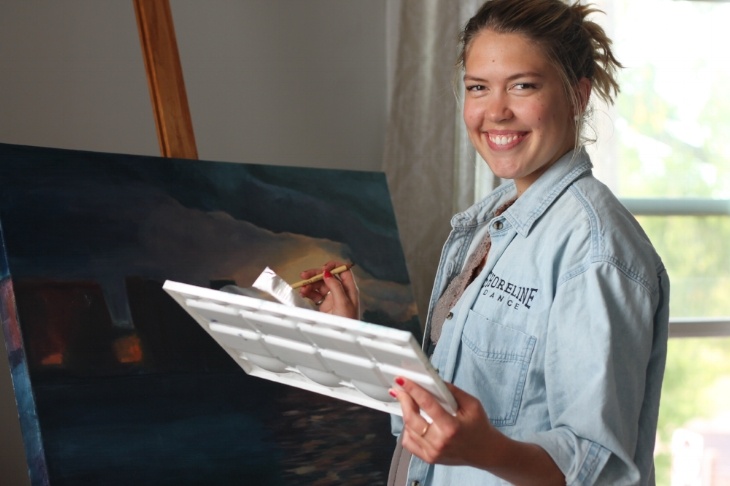
In her bedroom overlooking a noisy Hennepin Avenue in Minneapolis, Chloe Mark finds quiet time working on an oil painting. Noise from the tea shop downstairs leaks upwards, while the late afternoon sun pokes through the curtains.
Chloe started with us at ArcStone right after graduating from Carleton. For over two years, she's been splitting her time between digital marketing strategy and design, but just recently made a decision to go back to school to sharpen her design skills.
The decision was tossed back and forth, with finances and, most importantly, time carefully considered, but once the decision was made, she knew it was the right one and has fallen in love with her classes.
“It brings me back to my art classes at Carleton; having someone bring in the history of art and apply it to what you’re creating is so powerful,” Chloe shares. “Then you’re taking on what other people have done and making it your own or bringing it to the present day. If you’re just creating on your own, you’re in this bubble and you can never be as good as you want to be.
It’s the same for design. I was learning design on my own, but I didn't have that foundation of design or found the time to adequately understand the design's rich history. Now I feel I'm able to add an additional layer of meaning to my work. It also helps to be surrounded by a professor and students that are as fascinated as I am.”
Digital design is an extension of Chloe’s love for art, which began early in life with coloring books and paint. In high school, she took as many painting and drawing classes as she could. She recounted how she would show up to school early, put on music and lose herself in her work.
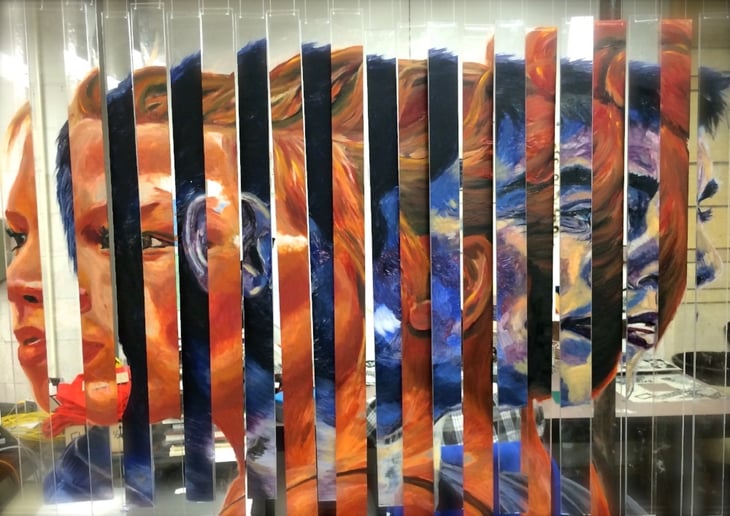
In school, Chloe resisted filling up her schedule with art and instead focused on writing-rich courses, history, political science and the like; she wanted to avoid the potential financial pitfalls and job insecurity that could come with a degree in art.
“I didn’t want to be a professional artist because I knew that for me, it would make the love of painting more stressful if I had to get money out of it,” Chloe admits. “That’s a really important distinction that artists face all of the time. ‘Is this worth becoming stressed out for?’
When I established I wasn't going down that road, I convinced myself I should major in something that would lead to a high-earning-potential career and could make art my hobby."
Striking a balance was something that she had to learn in college—she was tough on herself with her more challenging classes. She found that buckling down got to be too intense and stressful without some release, so she allowed herself some art classes to provide that.
It was only when she took an art class and picked up the paintbrush again did she find herself. “On the first day of my art class I thought, ‘Wow, I feel so at peace with myself. I feel like I’m working towards something that really matters to me." She confides. “It comes naturally, so it wasn’t forced like a lot of my other classes were.
I finally started thinking about it as a major towards the end of my sophomore year. As I dug into the liberal arts education more, I realized I was missing the bigger picture. I learned more about what employers look for when it comes to a liberal arts student—they don't necessarily look at what you majored in but more so your writing and innovative thinking skills, your internships and your overall success in classes.
Once I got that settled into my bones, I figured that as long as I was passionate and worked hard, I could choose whatever major I wanted. I could still take classes in other subjects, but art was what I wanted to give most of my time to."
Over the next two years at Carleton, Chloe was able to put more focus on art: for her this included painting, drawing, ceramics, printmaking and art history.
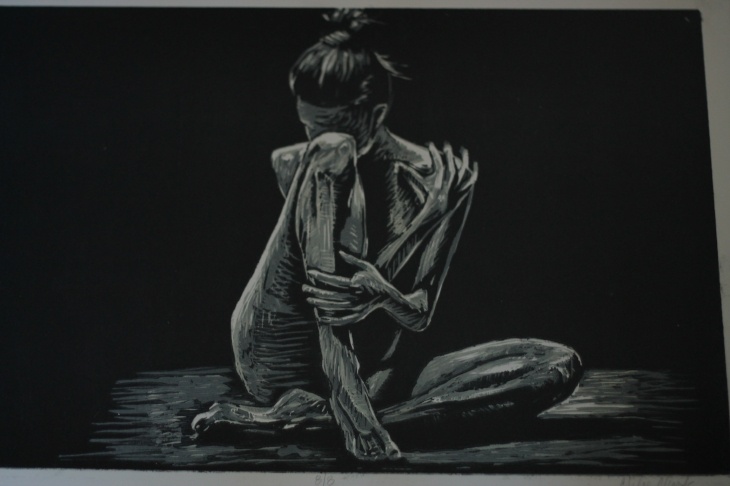

"I’m glad I did that, because now that I am in the real world, it’s hard to find time to take a class after work."
Marked laughed and pointed towards the canvas in her room, "I’ve been doing this painting for three months, and I haven’t finished it because it’s been hard to set aside six hours to cruise through something.”
Chloe went on to explain how lucky she feels she is able to apply her passion for art to her design work at ArcStone and her classes, "Once I realized I had an ability someone else may not have—that this may be the role I play in society and it’s unique to me—I knew I better take advantage of it. It's satisfying to feel my passion is growing into my career."
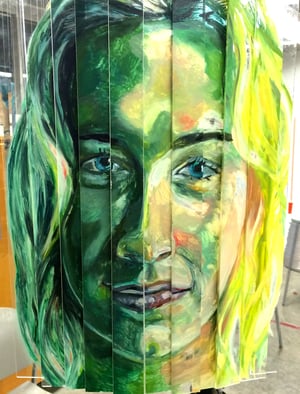
While she develops her design skills, she also thinks it's vital she starts giving more time and attention to her passion for art. “I would say a majority of Americans spend most of our time behind a computer screen, so we are one step removed from what we’re doing,” she explains. “You’re not touching what you’re doing; you're just looking at it. I’m a visual and interactive person. I like to touch things and be involved with the world around me.
Similar to when I cook or do anything independent, I love when I’m doing as much of the steps as possible. If I could grow, harvest, clean, chop and cook the food I made, I would. With painting, if I can build my canvas, adjust it and lay it all out, that’s so satisfying to me. So much of what we do is dependent on someone else. It's a thrill to feel the independence.
Painting is a perfect way to work in the visual sphere, but also with something tangible. I love the feeling of the paintbrush in my hand, how my little movements can change the overall results. I’m in control of what it will look like.
This makes me want to start spending more time sketching and drawing out my designs before I start desining on the computer. If I jump right in, there’s a gap between me and the result as there's a machine and program involved. Many more pieces have to happen—mouse clicks, tutorials and keyboard shortcuts—before I can get exactly what I want.
With drawing and painting, my body is my machine.”
Chloe points out the work culture at ArcStone helps her pursue her passion in and outside of work. She explains that it's a mix of the environment cultivated by owners David and Lisa (who pursue their passion of music outside of work in their band) and the way that the company draws those sort of individuals who have artistic passions.
When asked about why she thinks we should all have side projects, she points out, “It’s against human nature to be one thing. We get too bored. When we're young we bounce all around, 'Ooh, I want to color. Ooh, I want to go play outside. Ooh, I want to learn about this thing.’ We’re fascinated by the world around us.
Then we go to school and get confined to more and more systems. We're instructed to focus and specialize in a few things. And most of us settle into that once we get a job, thinking ‘this is my life. It feels safe to be in this box.’
But again, that’s not natural to us as humans. We need more than one focus. When I paint or do something outside of work, I’m more energized coming back to the office. I think once you're fulfilling all different sides of yourself, your day job is more fulfilling, too."
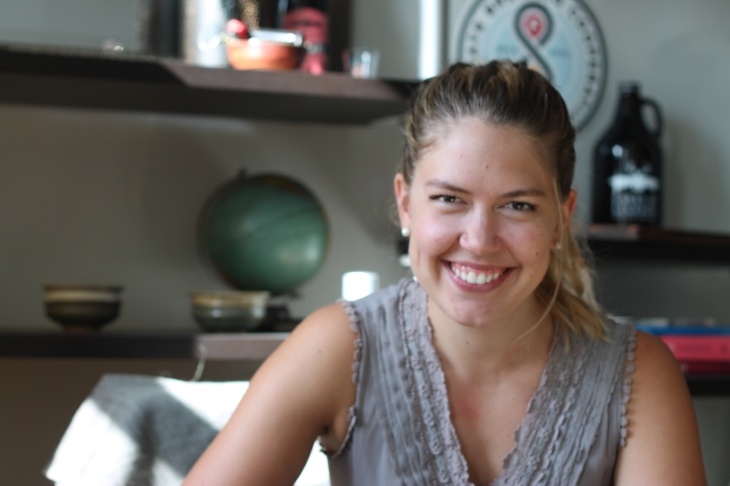
This November, we're hosting an event on the Greenway, which we named "Happy(our)." We're interviewing Minneapolites such as Brian Oake from The Current and entrepreneur Aubry Walch of Herbivorous Butcher on how they have created an environment to grow and foster happiness in their work. We should mention, there will be food and wine involved. Sign up with the button below!
Join Us at happy(our)
This November 8th, we're hosting happy(our) in our ArcStone office to start the conversation on how to bring happiness to work.
Join us for an engaging afternoon as we examine the interplay between our work and our well-being.
